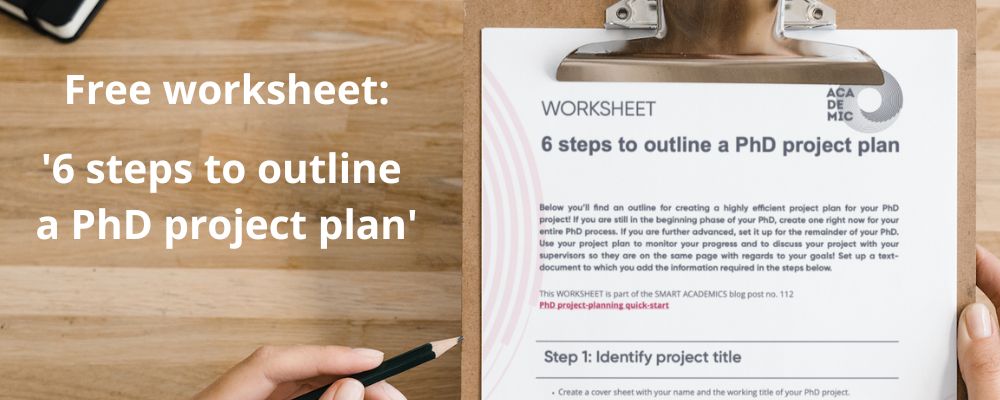Let’s get straight to the point: If you realistically want to have a chance of finishing your PhD on time, you’ll have to plan your project. More specifically, you have to apply project management techniques and appoint yourself the manager of that project. Many PhD candidates have trouble setting up and following a project plan. That is why in this blogpost, we’ll let you know what it means to manage your PhD project and we’ll share an awesome free worksheet: 6 steps to outline a PhD project plan. With this, you can start drafting your project plan without struggle and endless searching for the right procedure.
My experiences with project planning
When I set out to apply for a scholarship to fund my PhD project, my supervisor, a professor at the University of Heidelberg, told me to describe exactly what I wanted to achieve in my project, and to set up a Gantt-Chart so my proposal would convince the funding agency that my project was worth the investment. My professor was tight-lipped and I did not get any further information on how to work out my project plan. I dived into the university library for the latest project-management guides, and it took a lot of time to figure it all out and come up with a reasonable plan for my PhD project. I got the funding for the project, and once I started, I used my plan to guide me throughout my project. I adjusted it every now and then, but it helped me never lose sight of my goals and to finish within the 3 years that I had.
I have used project plans ever since. In the 12 years that I have worked as a scientist, there were many plans for small projects within my own group or institute, as well as for large multinational EU-framework funded project clusters. And since running TRESS ACADEMIC, whenever we set up a new course or revise our website, the first thing we do is set up a project plan. We even have mini-project plans for our weekly blog posts with the exact tasks we have to do and when they need to be completed. For me, this has become second nature: No project without a plan.

Common myths around project planning for PhD projects
1. Believing you don’t know enough
Many PhD students don’t devise a plan because they think they don’t know enough about their project–particularly what the end results might be. That is a very common excuse to avoid thinking about the goals and outcomes of the project, as well as the entire process that will lead you there. You can read more about this and other common objections on the SMART ACADEMICS BLOG post no. 47: Plan your project – save your PhD!
2. Believing a plan is set in stone
In other words, you are afraid that once the plan is set, you lose all freedom and flexibility in your research.
Don’t think that once the plan is drawn up, your project will be carried out in this exact way. None of my projects were ever carried out exactly as I had initially planned. The goal is not to set-up regulations that dictate your every move, but to set-up a plan that will steer your project along the correct path. Your plan helps you make informed decisions on where to take your project at any point in time. You can stick to the plan or adjust it if you determine that a deviation is superior to what you have initially planned. This is how your project will evolve and improve over time.
3. Believing it’s better to wait and see what happens
There is still a wide-spread belief that you start a PhD and just see what comes your way or what will develop once your supervisors give you some initial input. This is blind-trust that the brilliant scientists around you will show you the safe route to finish on time with stellar results. Hint: They won’t, and it’s not their task. While I hope that your supervisor will give you input and bounce around ideas with you (that is indeed their task), don’t expect them to run this project for you. This is your PhD, not theirs.
4. Believing you don’t need a personal plan for your PhD because there is already one for the bigger project you’re working in
Are you a PhD working in a larger research project with many collaborating scientists? Is your PhD project only focusing on one aspect among many ? When you get the project plan for the bigger project (or the part that your supervisor is responsible for) handed to you, you may think: Great, that’s my plan! I don’t need a separate one for myself. Wrong. Although your PhD will take place under the umbrella of this bigger project, you need to sit down and identify exactly what you are going to do that a) serves the goals of the overall project b) merits a PhD.

If you fail to plan you plan to fail
Data from empirical surveys show over and over again that the majority of international PhD candidates delay (HEFCE 2007, Council of Graduate Schools 2008, SCB 2011, Van de Schoot et al. 2013, BuWiN 2021). That means their PhD project takes more time than initially planned. It may take five instead of the initially planned four years, or six instead of three. While there is some wriggle room for individual cases, there is none for others. “Delay is highly problematic for PhD students because in most cases it means that they receive no income anymore, because their employment contract or scholarship ends after a certain amount of time, regardless of whether or not the dissertation has been completed” (Van Rooij E. et al. 2021). International PhD candidates may have to leave their host countries when their contracts expire since their permission to stay is tied to their employment.
There are many reasons why PhD candidates delay. In our blog post no. 60: Are you delayed with your PhD? we list 10 common reasons. Not planning ahead for the 3-4 years of the PhD project is definitely one of them. Since this is entirely in your hands (no one will keep you from developing a project plan and tracking your progress), it is one of your biggest assets in avoiding a lengthy and painful delay. You’ve got to set clear goals from the first to the last day of your PhD, and the plan helps you put these into practice.
Don’t take a PhD delay and its negative consequences for granted. Review what has caused your delay and how you work on your PhD currently in order to identify what needs to change with our free worksheet: Identify main reasons for the delay with your PhD .
You don’t have to major in project management
You’re not overly interested in project management? I get it. You’re here to work on your science. Point taken. I agree that you should focus on becoming an expert in your scientific field over project management. And: Managing a scientific project has a few different requirements than managing a project in an industrial, commercial or philanthropic setting. So even just having general project management skills won’t necessarily help you a lot. That’s why we at TRESS ACADEMIC have developed tools and techniques to help you acquire the necessary skills to manage your PhD project in the fastest and most efficient way. We’re not tinkering around with theory, but instead give you PhD specific practical advice. In our course PhD Success Lab, we teach PhD candidates the exact steps to take to set up a project plan and manage their project throughout their 3-4 year PhD process, progress-tracking included. Many report that having a clear road-map takes a big weight off their shoulders, and makes them feel less overwhelmed and more confident.
Let’s give you a head-start
We’ve thought about how we can make PhD project-management easier for everyone right now. What we’ve realised over the years is that PhD candidates don’t know what a project plan should look like; they’re uncertain where to begin and what to include. To give you a head-start, get our free worksheet “6 steps to outline a PhD project plan” with the exact steps you have to take to set up your own. So you don’t have to figure it out all alone like I had to at the start of my PhD! Get going!

Will you do us a favour?
Since we are sharing this for free, please refer to the SMART ACADEMICS BLOG whenever you use our material. We’d be delighted if you share this blogpost with a friend or colleague who needs to brush up their project management skills. If you are a professor or supervisor, please share this with your team or PhD candidates.

Resources:
- SMART ACADEMICS BLOG post no. 47: Plan your project – save your PhD!
- SMART ACADEMICS BLOG post no. 60: Are you delayed with your PhD?
- SMART ACADEMICS BLOG post no. 73: What’s needed to finish your PhD?
- free worksheet: 6 steps to outline a PhD project plan
- free worksheet: Identify main reasons for the delay with your PhD
- free worksheet: Completing my PhD: what’s needed?
References:
- BuWiN (Konsortium Bundesbericht Wissenschaftlicher Nachwuchs). 2021. Bundesbericht Wissenschaftlicher Nachwuchs 2021. Statistische Daten und Forschungsbefunde zu Promovierenden und Promovierten in Deutschland. WBV-Media, Bielefeld. DOI:10.3278/6004603aw
- Council of Graduate Schools (ed.) 2008. Ph.D. Completion and Attrition: Analysis of Baseline Demographic Data from the Ph.D. Completion Project. Washington DC: CGS-Publications.
- Higher Education Funding Council for England (HEFCE) 2007. PhD research degrees – update. Entry and completion. HEFCE Issues paper 2007/28.
- Högskoleverket, Statisktika centralbyrån (SCB) 2011. Universitet och högskolor. Doktorander och examina på forskarnivå 2011. Serie Utbildning och forskning. 21 Juni 2012.
- Van Rooij E., Fokkens-Bruinsma M., and Jansen E. 2021: Factors that influence PhD candidates’ success: the importance of PhD project characteristics. Studies in Continuing Education, Vol. 43, No. 1, 48-67 https://doi.org/10.1080/0158037X.2019.1652158
- Van de Schoot, R., M. A. Yerkes, J. M. Mouw, H. Sonneveld. 2013. What Took Them So Long? Explaining PhD Delays among Doctoral Candidates. PLOS ONE 8 (7): e68839. doi: 10.1371/journal.pone.0068839
Related courses and services:
More information
Do you want to successfully complete your PhD? If so, please sign up to receive our free guides.
Photo by brands-people on unsplash
© 2022 Tress Academic
